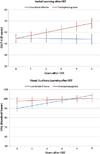Learning and memory following conformal radiation therapy for pediatric craniopharyngioma and low-grade glioma
- PMID: 22867897
- PMCID: PMC3534785
- DOI: 10.1016/j.ijrobp.2012.03.066
Learning and memory following conformal radiation therapy for pediatric craniopharyngioma and low-grade glioma
Abstract
Purpose: The primary objective of this study was to examine whether children with low-grade glioma (LGG) or craniopharyngioma had impaired learning and memory after conformal radiation therapy (CRT). A secondary objective was to determine whether children who received chemotherapy before CRT, a treatment often used to delay radiation therapy in younger children with LGG, received any protective benefit with respect to learning.
Methods and materials: Learning and memory in 57 children with LGG and 44 children with craniopharyngioma were assessed with the California Verbal Learning Test-Children's Version and the Visual-Auditory Learning tests. Learning measures were administered before CRT, 6 months later, and then yearly for a total of 5 years.
Results: No decline in learning scores after CRT was observed when patients were grouped by diagnosis. For children with LGG, chemotherapy before CRT did not provide a protective effect on learning. Multiple regression analyses, which accounted for age and tumor volume and location, found that children treated with chemotherapy before CRT were at greater risk of decline on learning measures than those treated with CRT alone. Variables predictive of learning and memory decline included hydrocephalus, shunt insertion, younger age at time of treatment, female gender, and pre-CRT chemotherapy.
Conclusions: This study did not reveal any impairment or decline in learning after CRT in overall aggregate learning scores. However, several important variables were found to have a significant effect on neurocognitive outcome. Specifically, chemotherapy before CRT was predictive of worse outcome on verbal learning in LGG patients. In addition, hydrocephalus and shunt insertion in craniopharyngioma were found to be predictive of worse neurocognitive outcome, suggesting a more aggressive natural history for those patients.
Copyright © 2012 Elsevier Inc. All rights reserved.
Conflict of interest statement
Conflict of interest: none.
Figures


References
-
- Packer RJ, MacDonald T, Vezina G. Central nervous system tumors. Pediatr Clin N Am. 2008;55:121–145. - PubMed
-
- Nathan PC, Patel SK, Dilley K, et al. Guidelines for identification of, advocacy for, intervention in neurocognitive problems in survivors of childhood cancer: a report from the Children’s Oncology Group. Arch Pediatr Adolesc Med. 2007;161:798–806. - PubMed
-
- Ris D, Beebe DW. Neurodevelopmental outcomes of children with low-grade gliomas. Dev Dis. 2008;14:196–202. - PubMed
-
- Turner C, Chordas C, Liptak C, et al. Medical, psychological, cognitive and educational late effects in pediatric low-grade glioma survivors treated with surgery only. Pediatr Blood Cancer. 2009;53:417–423. - PubMed
Publication types
MeSH terms
Grants and funding
LinkOut - more resources
Full Text Sources
Medical
Research Materials

